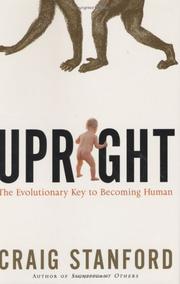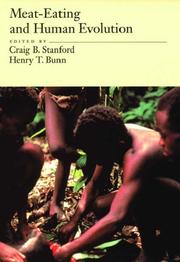| Listing 1 - 10 of 12 | << page >> |
Sort by
|
Book
ISBN: 0674071662 0674067886 9780674067882 9780674067042 0674067045 9780674071667 Year: 2012 Publisher: Cambridge, Mass. Belknap Press of Harvard University Press
Abstract | Keywords | Export | Availability | Bookmark
 Loading...
Loading...Choose an application
- Reference Manager
- EndNote
- RefWorks (Direct export to RefWorks)
Planet Without Apes demands that we consider whether we can live with the consequences of wiping our closest relatives off the face of the Earth. Leading primatologist Craig Stanford warns that extinction of the great apes-chimpanzees, bonobos, gorillas, and orangutans-threatens to become a reality within just a few human generations. We are on the verge of losing the last links to our evolutionary past, and to all the biological knowledge about ourselves that would die along with them. The crisis we face is tantamount to standing aside while our last extended family members vanish from the planet. Stanford sees great apes as not only intelligent but also possessed of a culture: both toolmakers and social beings capable of passing cultural knowledge down through generations. Compelled by his field research to take up the cause of conservation, he is unequivocal about where responsibility for extinction of these species lies. Our extermination campaign against the great apes has been as brutal as the genocide we have long practiced on one another. Stanford shows how complicity is shared by people far removed from apes' shrinking habitats. We learn about extinction's complex links with cell phones, European meat eaters, and ecotourism, along with the effects of Ebola virus, poverty, and political instability. Even the most environmentally concerned observers are unaware of many specific threats faced by great apes. Stanford fills us in, and then tells us how we can redirect the course of an otherwise bleak future.
Apes. --- Endangered species. --- Extinct animals. --- Extirpated animals --- Extirpated species --- Locally extinct animals --- Locally extinct species --- Animals --- Extinction (Biology) --- Endangered animal species --- Endangered animals --- Endangered wildlife --- Threatened animal species --- Threatened animals --- Threatened species --- Threatened wildlife --- Vanishing species --- Vanishing wildlife --- Wildlife, Endangered --- Wildlife, Threatened --- Wildlife, Vanishing --- Species --- Wildlife conservation --- Rare animals --- Hominoidea --- Primates

ISBN: 0618302476 Year: 2003 Publisher: Boston (Mass.) : Houghton Mifflin,
Abstract | Keywords | Export | Availability | Bookmark
 Loading...
Loading...Choose an application
- Reference Manager
- EndNote
- RefWorks (Direct export to RefWorks)
What, in evolutionary terms, propelled us to become human? According to Craig Stanford, codirector of the Jane Goodall Primate Research Center, the answer lies not in our forebears' big brains or their facility with language but in their ability to walk on two feet. The pivotal role of bipedalism in our development prompts a dramatic reappraisal of the common belief that millions of years ago some apes moved to the African savanna and evolved into runty hominids, who eventually metamorphosed into us. Newly found remnants of two-legged "proto-humans" show that our ancestry is much richer and more convoluted than that. Could it be that the iconic fossil Lucy is not one of our direct forebears? Might our evolutionary "tree" have more than one trunk? And do we really stand on the top rung of an evolutionary ladder of excellence? With his novel research and interpretations, Stanford offers a fresh, galvanizing take on what made us human.
Book
ISBN: 9780691222080 Year: 2020 Publisher: Princeton, NJ
Abstract | Keywords | Export | Availability | Bookmark
 Loading...
Loading...Choose an application
- Reference Manager
- EndNote
- RefWorks (Direct export to RefWorks)
Digital
ISBN: 9780674067882 9780674067042 Year: 2012 Publisher: Cambridge, Mass. Harvard University Press
Abstract | Keywords | Export | Availability | Bookmark
 Loading...
Loading...Choose an application
- Reference Manager
- EndNote
- RefWorks (Direct export to RefWorks)
Multi
ISBN: 9780674919778 0674919777 9780674977112 0674977114 Year: 2018 Publisher: Cambridge, Massachusetts
Abstract | Keywords | Export | Availability | Bookmark
 Loading...
Loading...Choose an application
- Reference Manager
- EndNote
- RefWorks (Direct export to RefWorks)
Digital
ISBN: 9780691222080 Year: 2020 Publisher: Princeton, N.J. Princeton University Press
Abstract | Keywords | Export | Availability | Bookmark
 Loading...
Loading...Choose an application
- Reference Manager
- EndNote
- RefWorks (Direct export to RefWorks)

ISBN: 0674033795 9780674033795 9780674027817 0674027817 9780674029903 0674029909 0674004582 9780674004580 0674010035 9780674010031 Year: 2008 Publisher: Cambridge, Mass. Harvard University Press
Abstract | Keywords | Export | Availability | Bookmark
 Loading...
Loading...Choose an application
- Reference Manager
- EndNote
- RefWorks (Direct export to RefWorks)
Offering a social and biological account of why psychoactive goods proved so seductive, David Courtwright tracks the intersecting paths by which popular drugs entered the stream of global commerce. He shows how the efforts of merchants and colonial planters expanded world supply, drove down prices, and drew millions of less affluent purchasers into the market, effectively democratizing drug consumption. He also shows how Europeans used alcohol as an inducement for native peoples to trade their furs, sell captives into slavery, and negotiate away their lands, and how monarchs taxed drugs to finance their wars and expanding empires. Forces of habit explains why such profitable exploitation has increasingly given way, over the last hundred years, to policies of restriction and prohibition--and how economic and cultural considerations have shaped those policies to determine which drugs are readily accessible, which strictly medicinal, and which forbidden altogether.
Apes --- Dolphins --- Animal societies. --- Psychology, Comparative. --- Behavior, Comparative --- Comparative behavior --- Comparative psychology --- Ethology, Comparative --- Intelligence of animals --- Zoology --- Animal behavior --- Animal intelligence --- Animal psychology --- Human behavior --- Instinct --- Social behavior in animals --- Behavior. --- Substance abuse --- Psychotropic drugs --- Abuse of substances --- Addiction, Substance --- Addictive behavior --- Chemical dependence --- Chemical dependency --- Substance addiction --- Substance dependence --- Substance-related disorders --- Substance use disorders --- Psychology, Pathological --- Psychiatric drugs --- Psychoactive drugs --- Psychopharmaceuticals --- Drugs --- Drugs of abuse --- Psychopharmacology --- Psychotropic plants --- History. --- Economic aspects. --- Social aspects. --- Prevention. --- History --- Economic aspects --- Prevention --- Social aspects --- Ethics and addiction --- World history --- anno 1800-1999 --- anno 1700-1799 --- Polytoxicomanie --- Psychotropes --- Histoire --- Aspect économique --- Aspect social --- Prévention
Digital
ISBN: 9780674033795 Year: 2021 Publisher: Cambridge, Mass. Harvard University Press
Abstract | Keywords | Export | Availability | Bookmark
 Loading...
Loading...Choose an application
- Reference Manager
- EndNote
- RefWorks (Direct export to RefWorks)

ISBN: 0195131398 Year: 2001 Publisher: Oxford : Oxford university press,
Abstract | Keywords | Export | Availability | Bookmark
 Loading...
Loading...Choose an application
- Reference Manager
- EndNote
- RefWorks (Direct export to RefWorks)
Fossil hominids. --- Human evolution. --- Meat --- Prehistoric peoples --- History. --- Food. --- Carnivora. --- Carnivores --- Homme --- Evolution

ISBN: 128083322X 0195351290 9780195351293 9781280833229 9786610833221 6610833222 0195131398 9780195131390 0197714625 Year: 2001 Publisher: Oxford [England] New York Oxford University Press
Abstract | Keywords | Export | Availability | Bookmark
 Loading...
Loading...Choose an application
- Reference Manager
- EndNote
- RefWorks (Direct export to RefWorks)
When, why and how early humans began to eat meat are fundamental, unresolved questions in the study of human origins.
Fossil hominids. --- Human evolution. --- Meat --- Prehistoric peoples --- Food --- Agriculture, Prehistoric --- Meats --- Food of animal origin --- Evolution (Biology) --- Physical anthropology --- Evolutionary psychology --- Human beings --- Early man --- Fossil hominins --- Fossil man --- Hominids, Fossil --- Hominins, Fossil --- Human fossils --- Human remains (Archaeology) --- Primates, Fossil --- Paleoanthropology --- History. --- Food. --- Origin --- Primitive societies --- Carnivora.
| Listing 1 - 10 of 12 | << page >> |
Sort by
|

 Search
Search Feedback
Feedback About UniCat
About UniCat  Help
Help News
News